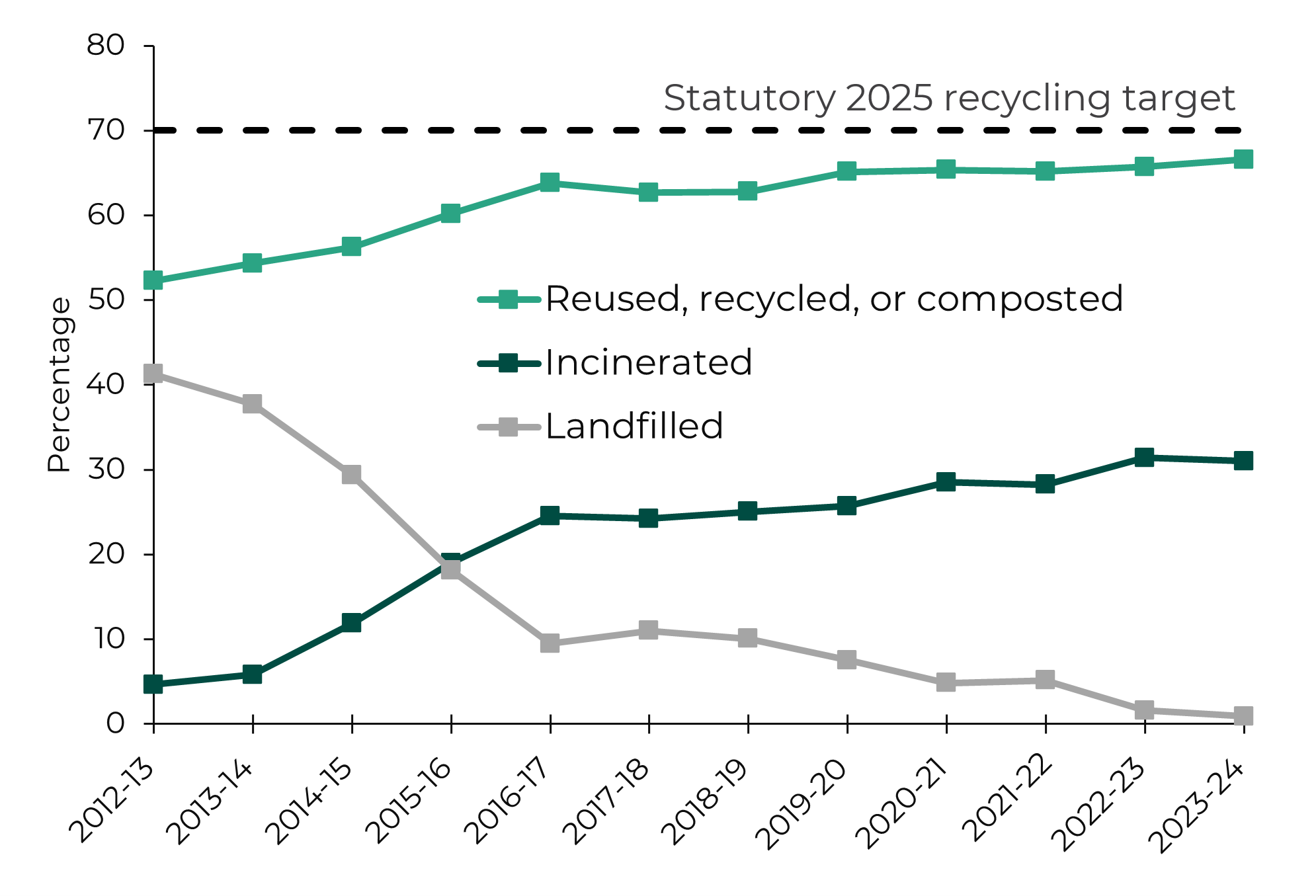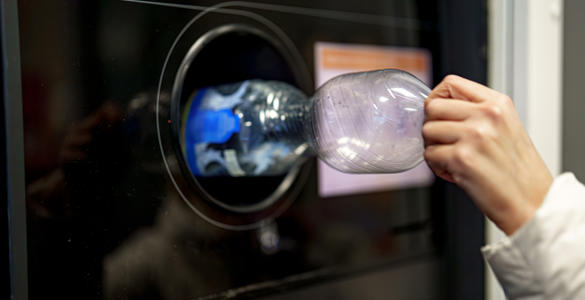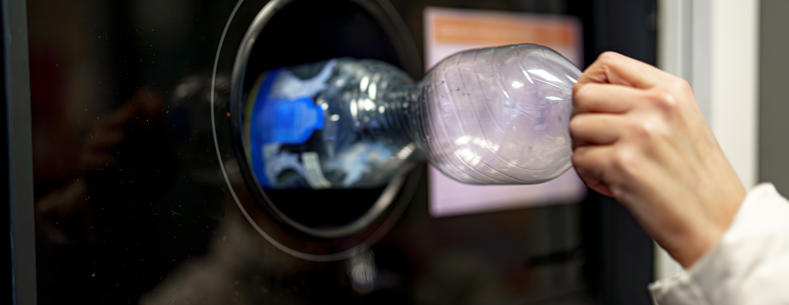Wales has one of the highest recycling rates in the world. A 2024 analysis of 48 countries found that only Austria recycled a higher proportion of its waste. But progress towards the Welsh Government’s goals, including reaching a 70% recycling rate by 2025 and ‘zero waste by 2050’, has been relatively slow since 2016.
Waste management by method (2012-2024)

Source - WasteDataFlow
To help sustain progress towards its recycling and reuse goals, plans for a Deposit Return Scheme (DRS) for drinks containers have been on the Welsh Government’s agenda since 2018. This article considers what a Welsh DRS might look like, and explores recent developments towards its introduction.
What is a Deposit Return Scheme?
Under a DRS, customers pay a small deposit on top of the price of an item, which is refunded when they return the item’s packaging to a collection point (often located within shops). A DRS aims to provide a financial incentive for people to recycle items such as plastic and glass bottles, reducing pollution and greenhouse gas emissions in the process.
Across Europe, DRSs are fairly common. All the Scandinavian countries have had schemes in place for over two decades, and Germany’s DRS has achieved a packaging return rate in excess of 98%. A DRS is managed by a scheme operator appointed by government – the operators are often part-owned by trade associations and drinks manufacturers.
What are the plans in Wales and the rest of the UK?
Wales, Scotland, and England all separately announced DRS plans in 2018, but subsequent progress across the UK has been sluggish and a surprising source of constitutional tension.
In 2021, the Welsh Government, UK Government (for England), and Northern Ireland’s Department of Agriculture, Environment and Rural Affairs, conducted a joint consultation on developing an aligned DRS for drinks containers in each country. In the consultation, the Welsh Government said it was planning to progress an “all-in DRS in Wales which includes polyethylene terephthalate plastic, steel and aluminium cans, and glass bottles”, whereas England and Northern Ireland would not initially include glass bottles in their schemes. The previous UK Government said “glass creates undue complexity for the drinks industry and it increases storage and handling costs for retailers.”
Meanwhile, the Scottish Government had planned a separate DRS, which would include glass, aluminium and plastic containers. Its plans faltered in May 2023 when the previous UK Government opposed the inclusion of glass products in Scotland’s DRS. This would have had consequences for the effectiveness of the Scottish DRS, which we explore later in this article.
Since then, the UK and all devolved governments had been working together on aligned and interoperable DRSs, which were originally due to commence in 2025, and later delayed until October 2027.
Wales goes it alone
In November 2024, the Deputy First Minister and Cabinet Secretary for Climate Change and Rural Affairs, Huw Irranca-Davies MS, announced the Welsh Government’s withdrawal from the joint process of developing aligned UK-wide DRSs. He cited his ambition to develop a DRS “that supports the transition to reuse for all drinks containers including those made from glass”.
Unlike plastic, which degrades slightly every time it is recycled, glass can be recycled an unlimited number of times without losing purity or quality. The majority of active DRSs in the world today include glass.
The Cabinet Secretary recently told the Senedd’s Climate Change, Environment, and Infrastructure (CCEI) Committee:
…we're in a different position in Wales, and we're keen to help the UK by moving ahead and showing where I think we will all eventually coalesce, which is coming together with DRS based on reuse as well as recycling.
The UK Internal Market Act: a barrier to implementation?
The Welsh Government’s desire to include glass in its DRS is complicated by the UK Internal Market Act 2020 (UKIMA), which the Cabinet Secretary referred to in his written statement.
As a DRS relates to the regulation of the sale of goods, it could be affected by the ‘market access principles’ that manage the UK’s internal market. These were established in UKIMA by the previous UK Government.
In this case, the market access principles would mean that producers in other parts of the UK would not need to comply with the Welsh DRS requirements relating to glass, which could cause significant challenges for managing the DRS. For example, any Welsh requirements for identifying in-scope containers, like a barcode, could not be enforced on goods originating in the rest of the UK. Businesses could choose to voluntarily adopt the Welsh requirements, but this could have impacts on their supply chain or give rise to additional costs.
Similar concerns about the impact on the operation of the DRS led the Scottish Government to change its position regarding glass and align with the proposed DRS scope for England and Northern Ireland. The Welsh Government could have taken a similar approach but its continued commitment to include glass means that the challenges posed by UKIMA remain. It could choose to take forward one of the following options:
- Proceed with a Welsh DRS that includes glass and manage the challenges that come as a result of UKIMA; or
- Request for deposit return schemes, including glass, to be given an exclusion from the market access principles. This would mean that producers from across the UK would need to comply with the Welsh DRS requirements once the scheme is in place. However, this would need agreement from the UK Government.
The Cabinet Secretary has already told the CCEI Committee in March 2025 that the Welsh Government would not be seeking an exclusion because “we’ve been working, now, in partnership” with the UK Government. Whilst he said that it is “a very different approach” to how the governments are working together, it’s uncertain how this will address the issues relating to UKIMA.
When will Wales have a DRS?
Despite the range of approaches taken by Welsh Government, it’s unclear when Wales will have an operational DRS. In January 2025, the Cabinet Secretary told the CCEI Committee that the Welsh Government would be consulting on a Wales-only DRS during 2025-26. On timescales, he said:
Originally, the timescale would have seen a full reuse scheme in place in 2027. That’s still in our minds, but, realistically, with engagement with stakeholders, we can put everything in place for the full roll-out in Wales not far off that timescale. I haven’t got a specific date yet, but we’re not starting from scratch with this.
Meanwhile, the UK, Northern Irish and Scottish governments recently appointed a scheme operator for their interoperable schemes. Almost a decade since it was first proposed, their DRS should begin in 2027, but will exclude glass.
Practical, financial, constitutional obstacles remain to be sorted before Wales has a glass-inclusive DRS.
Article by Dr Matthew Sutton & Josh Hayman, Senedd Research, Welsh Parliament






